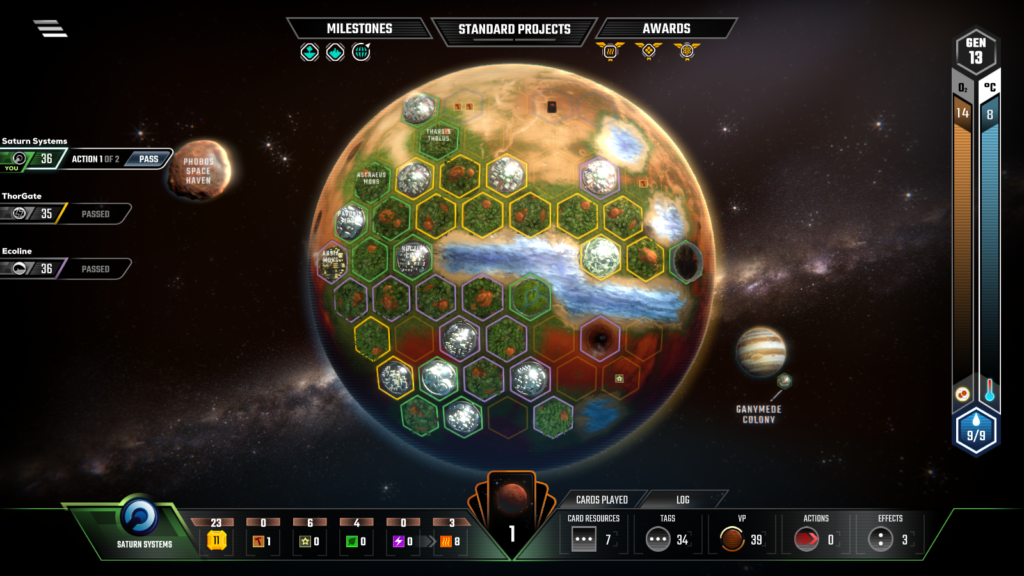Steve Barrera vs. the A.I.
It hasn’t come up much on my blog, but I am actually really into board gaming. It’s odd that I don’t blog about it; maybe I don’t want to mix business and pleasure, I don’t know. But anyway, I have been blogging about these coronavirus times, and how life has changed so much this past year. And one way that it’s changed from my board gaming hobby perspective is that I have fewer opportunities to sit down for tabletop gaming sessions. I haven’t been to a gaming convention since January!
So one way to compensate for that lack of real life gaming is to play digital versions of favorite games. I don’t mean video games; I mean computer programs that simulate board games, and there are actually quite a few good ones. You can play online against other people, or you can play a “local” game – meaning no network required – against the computer itself. You play against simulated “A.I. player” opponents.
Which takes me to the topic of this post, which is the quality of the A.I. opponents. What I have found is that for some games they are very good, and for others – not so much. Some games I win against the A.I.s every time, and others it’s more 50/50. Now there are two possible explanations for this: 1) I am better at some games than at others or 2) the A.I.s are programmed better for some games than for others.

A.I. game programming.
It seems obvious that it’s a bit of both. But then you have to wonder, in the case of both explanations: why?
Is there something about my cognitive psychology that makes some game designs or mechanics easier for me to figure out than others? It honestly seems that way to me. I generally do well at board games, but there are some that I struggle with compared to others. There are some that I have never won playing against other humans, even though I have won against those same people at other games. I’m sure that other board gamers understand the experience. So there must be some correlation between how my intellect works and what sorts of games I am good at.
As for the programmed A.I.s, well, there are two possibilities to consider. It could be that some games are inherently easier to program A.I. players for than others, and it could be that some programmers or programming teams made a better effort at the A.I. programming than others. Let’s face it, these projects have limited timelines and bugdgets, and if the programmers only made the A.I. so good before release day, that’s just the level of A.I. that everyone will have to live with.

If some games are easier to program A.I.s for than others, then the next question is – what are the parameters that make for a game that can be mastered by A.I.? Probably the most famous example of such a game is Chess: it’s common knowledge that a computer program beat a world Chess champion, back in 1997. And it just keeps getting worse for the humans. Another game that humans might as well retire from is Go.
Now, Chess and Go are both games that are simple in their rules, but strategically very deep. They also have no random elements, meaning all possible future paths of a game are determined, given the current game state. Computers have an innate advantage over humans in these sorts of games in that they have much more capacity for information storage, which allows for plotting ahead many moves – pretty much the key to winning these kinds of games.
The board games that I prefer have more complicated rules, generally because they are simulating some real life scenario like exploration and development, or world-building. They are what we call heavily thematic games. And they have some randomization to them – typically a deck of cards that are shuffled and dealt out, or drafted, to the players. This means the outcome isn’t deterministic, and there is some luck involved. You can have an advantage by chance, not just because of superior information processing ability.
But you would think that, even then, the A.I.’s would reign supreme. They just have to include the stochastic factor of the game in their algorithms. The only advantage humans should have might come from intuition – the old ‘gut feeling’ that might be able to predict, or even influence, random outcomes. This is a tantalizing possibility based on the idea of primacy of consciousness, but I won’t get into it any further in this post.
Now another thing about Chess and Go is that they are both games where you can be ranked compared to other players. If you are lower ranked than another player, you pretty much have no chance to beat them at the game. Improving your rank requires much practice. This is because of how strategically deep these games are.
The board games I like really aren’t as deep, despite being more complex in terms of total rules. I wonder if it would ever make sense to have rankings for such games; the closest thing to that would be win rates and high scores as tracked on the online gaming platforms. But those statistics alone don’t constitute a ranking in the Chess sense; they aren’t as strong a predictor of who would win a game, in part because of the random element.
Probably ranking systems for all these different board games won’t emerge, because there just isn’t as broad an interest in them as there is in classics like Chess and Go. And probably no A.I. will ever be programmed that plays them perfectly, to prove once and for all how inferior humans are. No one will bother to take the time, given how many of these board games there are and how niche they are.
Maybe when the Singularity comes, the A.I. net will finally get around to mastering every known board game, and put us humans in our place. Hopefully it will let us play against “dumbed down” A.I.s as we while away our pointless lives in our soylent green pods. It will help to pass the time.
4 thoughts on “Steve Barrera vs. the A.I.”
Did you know that you can generate Elo ratings for just about any game? If people wanted to have Terraforming Mars tournaments, they could track rankings.
https://en.wikipedia.org/wiki/Elo_rating_system
Oh, that’s cool. So you can do the ratings for any game; it’s just a formula based on plays and wins, with relative ratings taken into account. I might have known, since online platforms generally have some kind of rating or experience level attached to user profiles.
I still wonder if for some games the ratings are a better predictor of whether you will win or lose against a particular opponent. It could relate to the strategic depth of the game, and whether or not there is any random element.
Also, one might still expect the ratings to have more meaning for games that are played more extensively; that is, those that have more data from which the statistics are generated.
So after bragging that I always win at Terraforming Mars, for the first time I lost a game to the A.I.s. Now, this was after I downloaded the Prelude DLC, so maybe either the A.I. programming was improved, or once you add the expansion I am not as good at the game. Or maybe it was sheer bad luck. I sure hope I’m not losing my mojo.